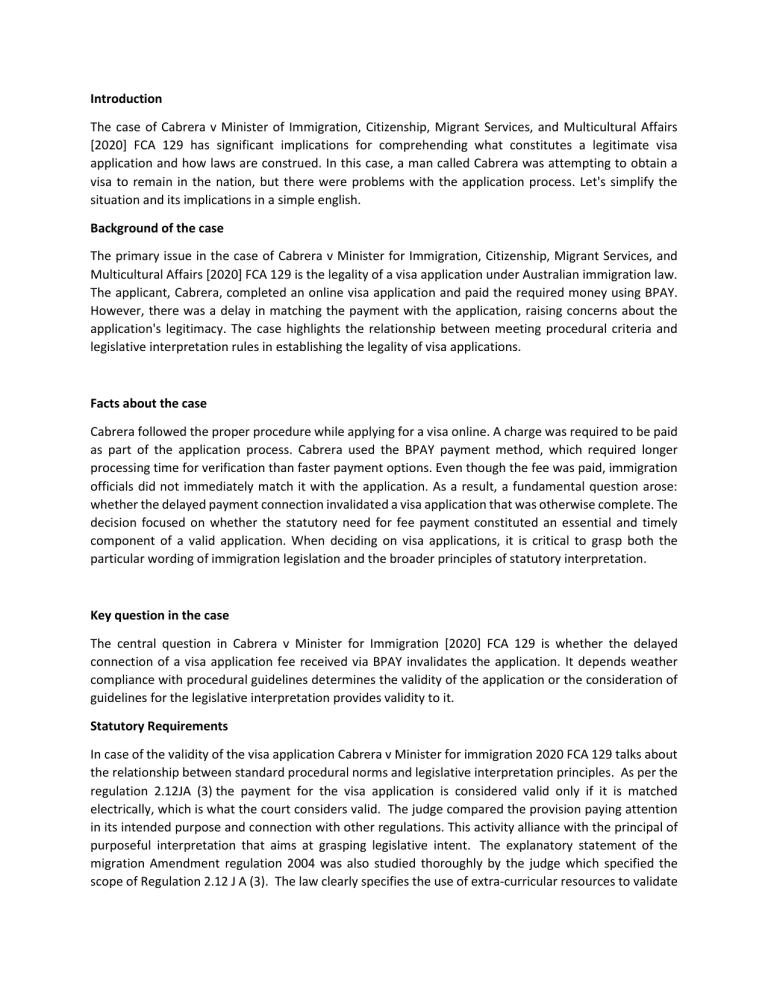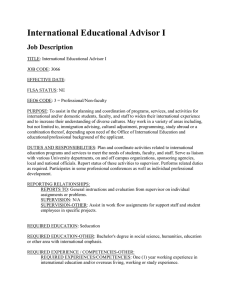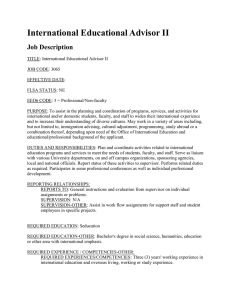
Introduction The case of Cabrera v Minister of Immigration, Citizenship, Migrant Services, and Multicultural Affairs [2020] FCA 129 has significant implications for comprehending what constitutes a legitimate visa application and how laws are construed. In this case, a man called Cabrera was attempting to obtain a visa to remain in the nation, but there were problems with the application process. Let's simplify the situation and its implications in a simple english. Background of the case The primary issue in the case of Cabrera v Minister for Immigration, Citizenship, Migrant Services, and Multicultural Affairs [2020] FCA 129 is the legality of a visa application under Australian immigration law. The applicant, Cabrera, completed an online visa application and paid the required money using BPAY. However, there was a delay in matching the payment with the application, raising concerns about the application's legitimacy. The case highlights the relationship between meeting procedural criteria and legislative interpretation rules in establishing the legality of visa applications. Facts about the case Cabrera followed the proper procedure while applying for a visa online. A charge was required to be paid as part of the application process. Cabrera used the BPAY payment method, which required longer processing time for verification than faster payment options. Even though the fee was paid, immigration officials did not immediately match it with the application. As a result, a fundamental question arose: whether the delayed payment connection invalidated a visa application that was otherwise complete. The decision focused on whether the statutory need for fee payment constituted an essential and timely component of a valid application. When deciding on visa applications, it is critical to grasp both the particular wording of immigration legislation and the broader principles of statutory interpretation. Key question in the case The central question in Cabrera v Minister for Immigration [2020] FCA 129 is whether the delayed connection of a visa application fee received via BPAY invalidates the application. It depends weather compliance with procedural guidelines determines the validity of the application or the consideration of guidelines for the legislative interpretation provides validity to it. Statutory Requirements In case of the validity of the visa application Cabrera v Minister for immigration 2020 FCA 129 talks about the relationship between standard procedural norms and legislative interpretation principles. As per the regulation 2.12JA (3) the payment for the visa application is considered valid only if it is matched electrically, which is what the court considers valid. The judge compared the provision paying attention in its intended purpose and connection with other regulations. This activity alliance with the principal of purposeful interpretation that aims at grasping legislative intent. The explanatory statement of the migration Amendment regulation 2004 was also studied thoroughly by the judge which specified the scope of Regulation 2.12 J A (3). The law clearly specifies the use of extra-curricular resources to validate the analysis is in line with the regulation. The court made a point that the content of the regulation should be analyzed and studied in the broader spectrum of legislative aims. The court's focus on the distinction between "making" and "validity" of an application reflects the idea of giving every word in law effect. When analysing complex regulatory frameworks such as immigration law, it is vital to understand the background, legislative intent, and practical implications of statutory provisions. Implications The judgement in Cabrera v Minister for Immigration [2020] FCA 129 has major ramifications for legitimate visa applications and legislative interpretation principles. This lawsuit centres around the interpretation of Regulation 2.12JA(3) of the Migration Regulations 1994, which relates to the timing of receiving a visa application charge and its electronic matching. The court's consideration of this legislation and its surrounding context throws light on many crucial issues. Procedural Rigidity vs. Legislative aim: The case emphasises the conflict between procedural rigidity and legislative aim. Regulation 2.12JA(3) states that a visa application charge is only deemed received when it is electronically matched. However, the court recognised that such rigidity might contradict with the greater legislative objective. The goal of this law is to guarantee fast processing of visa applications and to avoid frivolous submissions. However, the court observed that rigorously interpreting this rule might result in ludicrous consequences in which innocent applicants may be penalised owing to technical difficulties in computerised matching. This highlights the court's responsibility in reconciling tight procedural procedures with the fundamental objective of the statute. Principle of Purposive Interpretation: The case emphasises the notion of purposive interpretation, which entails determining the legislative intent behind a statute. The court scrutinised the language of Regulation 2.12JA(3) while assessing its intent within the context of migration legislation. The court attempted to ascertain the logic underlying the rule by referring to the Explanatory Statement of the Migration Amendment Regulations 2004. This approach is consistent with the increasingly prevalent legal tradition of interpreting a statute's intent by looking beyond its plain language. By diving extensively into the meaning and purpose of the context, the court showed its dedication to understanding the spirit of the law and the goals it seeks to achieve. Interpretive tools vs extraneous materials The Cabrera case illustrated how crucial extrinsic components, such the Explanatory Statement, are for comprehending the goal of legislation. Courts consult these texts to clarify murky legislation. The court looked at the Explanatory Statement of the Migration Amendment Regulations 2004 to shed light on the legislative goal of Regulation 2.12JA(3). Because of this reliance on other sources, it is possible to gain a deeper understanding of how the rule fits into the larger migration framework. Extrinsic materials are only employed when there is ambiguity, it is crucial to emphasise. The example illustrates how such sources could provide insightful information on the legislative objective, enabling a more knowledgeable and contextually coherent interpretation. Provisions that are context-sensitive The idea of contextual harmonisation highlights that various legal provisions must be interpreted such that they interact rationally and efficiently. The court evaluated Regulation 2.12JA(3) in connection with other related rules and visa restrictions in Cabrera v. Minister for Immigration, which exemplifies this principle. The court emphasised the need of avoiding interpretations that render any component of the law worthless or ineffectual. In this case, the judge made certain that Regulation 2.12JA(3) was consistent with the larger legislative framework governing migration. This concept guards against interpretations that might result in inconsistent implementations of the same legislation. It maintains the objective that the law is a unified instrument that serves a consistent function across its many portions. Balancing procedural laws and the technical requirements The case addresses the problem of how to strike a balance between procedural fairness and technical requirement. The court acknowledged that a rigid reading of Regulation 2.12JA(3) might result in instances in which innocent applicants are unfairly penalised due to technological inconsistencies. This demonstrates the court's concern for protecting the rights of persons involved in complicated regulatory processes. It did, however, decide in Cabrera's favour, emphasising that strict attention to technicalities should not unfairly prejudice visa applicants. This displays a judicial proclivity to respect natural justice and fairness principles, ensuring that persons are not denied rights owing to modest, non-prejudicial errors. This approach is consistent with the wider legal framework's goal of achieving just results. While technical norms are necessary for order, the ruling emphasises that they should not take precedence over the pursuit of justice. Precedential values and future cases The decision in Cabrera v Minister for Immigration [2020] FCA 129 establishes a precedent for future cases with comparable difficulties. As a Federal Court ruling, it has persuasive power for subordinate courts and decision-makers dealing with similar concerns. This decision directs how statutory interpretation principles should be used to migration situations, emphasising purposeful interpretation, wide use of extrinsic information, and contextual harmonisation. This case will be used by legal experts and migration agents when arguing for reasonable and fair visa application evaluations. However, the precise impact will be determined by the facts of each case and any prospective legislative amendments. It is crucial to recognise that, while precedents give advice, they can be separated based on factual differences. Impact on migration law practice The ruling's implications have significantly altered the landscape of migration law practise. Migration agents and legal practitioners must now handle the complexities of legislative interpretation identified in Cabrera with care. This case emphasises the need of having a thorough awareness of a client's unique circumstances as well as the developing interpretations of migration law. Agents must engage with extrinsic materials competently, carefully evaluating parliamentary discussions, official reports, and international commitments. This precedent necessitates a more comprehensive strategy, combining legal competence with a detailed understanding of the real-world implications of a visa application. As a result, migration law practitioners should prioritise staying current on developing interpretations while remaining sensitive to the human elements of each case. This ruling promotes a more open, responsible, and equal visa application procedure. Policy considerations and legislative review The Cabrera decision warrants a thorough assessment of migration-related legislation and practises. Policymakers and legislators must determine whether the present statutory framework is consistent with the court's purposive and harmonious interpretation standards. The court's attention on individual situations and equitable treatment needs regulations that address humanitarian and humane concerns beyond technicalities. This ruling supports a more inclusive approach, encouraging a reevaluation of visa criteria and the weightage allocated to procedural requirements. Policymakers may consider revising regulations to avoid inflexible interpretations that lead to unfair consequences. The decision also emphasises the importance of clear communication within law to avoid future anomalies. Conclusion Finally, the Cabrera v. Minister for Immigration case from 2020 has a substantial influence on the landscape of legitimate visa applications and legislative interpretation in migration law. Hence the evolved case demonstrate that the court preferred to interpret the law and regulation according to is preferred use. They actually take into account the several rules and regulations and extra sources to valid the verdict. Judges always try their best to be fair to everyone. All of this activities are crucial because it helps to reduce the complexity of visa process and helps the people like migration agents, attorneys and visa applicants to do their works. The regulation also raises the realization among the authorities to not only follow the technicalities but also be fair to everyone. This case also has the profound effect on the migration laws as it persuades the migration workers to think about the limits of these laws. Additionally, it instructs policymakers to study and modify existing regulations to comply with the ruling.




